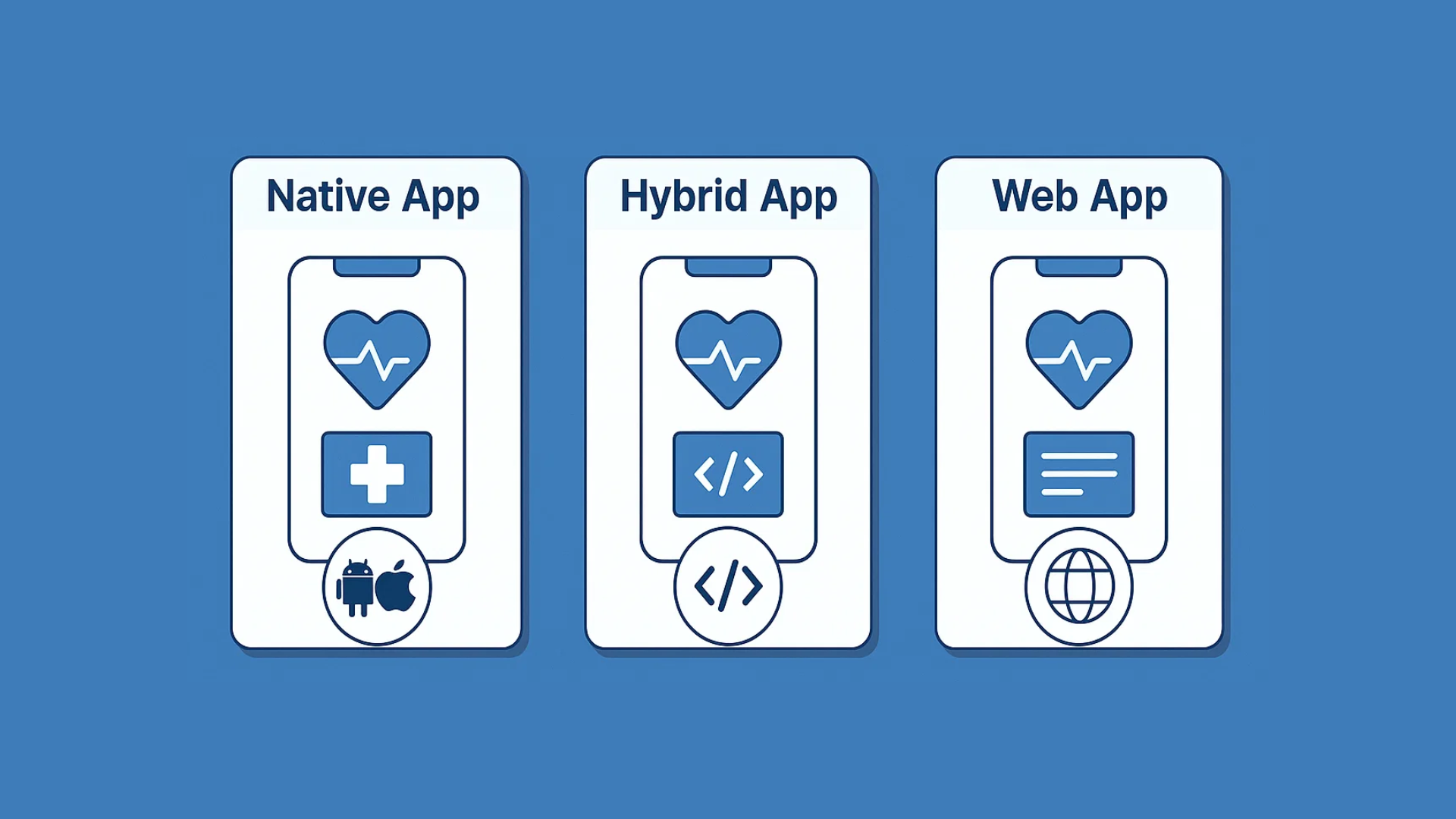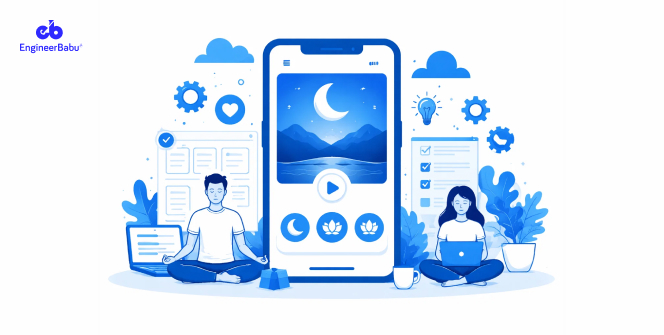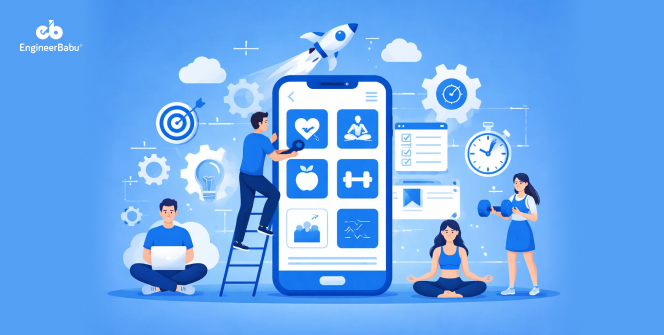When a healthcare app crashes during a patient consultation or delays a critical update, it’s not just bad UX — it’s a direct hit to trust, outcomes, and business reputation. In a field where seconds can define success or failure, the tech stack behind your app silently determines everything: speed, security, scalability, and survival.
Yet the decision between building a native, hybrid, or web app is often rushed — or worse, based on outdated assumptions. According to a 2023 Rock Health report, nearly 44% of digital health startups that failed in the past five years cited poor technology choices as a core reason. The cost of a wrong decision? Months of rework, compliance risks, and users lost to competitors.
This guide provides a clear breakdown of native vs. hybrid vs. web apps — with a healthcare lens. Let’s build not just an app, but a platform of trust and performance.
What is a Native App?
A native app is a mobile application built specifically for a single platform — like iOS or Android — using the platform’s own programming languages and tools. Think Swift for iOS or Kotlin for Android.
Native apps are designed to feel like a seamless extension of the device itself, offering the fastest performance, the deepest integration with device features (camera, GPS, biometrics), and the most polished user experience.
Apps that handle sensitive patient data, need real-time updates, or require advanced device integrations (like Bluetooth for wearable health monitors) often rely on native development.
For instance, MyChart by Epic Systems, one of the most widely used patient portal apps in the U.S., is a fully native app to ensure HIPAA-compliant security and fast performance under heavy load.
What is a Hybrid App?
A hybrid app is a blend — part native, part web. It’s built using web technologies like HTML, CSS, and JavaScript, but it’s wrapped inside a native container that allows it to be installed on a device just like a native app.
Frameworks like React Native, Flutter, and Ionic have made hybrid app development faster and more powerful than ever.
In healthcare, hybrid apps are often the go-to choice for startups and organizations looking to get to market quickly without breaking the bank. For example, a health and wellness startup might build a hybrid app for appointment scheduling, fitness tracking, or patient education — features that don’t demand ultra-high performance but still need a smooth mobile experience.
What is a Web App?
A web app is essentially a mobile-optimized website that behaves like an app but runs entirely in a browser. Instead of downloading it from the App Store or Google Play, users simply access it through a URL — no installation required. Technologies like Progressive Web Apps (PWAs) have made web apps feel increasingly “app-like” with features such as offline access, push notifications, and home screen shortcuts.
In healthcare, web apps are often used when broad accessibility and ease of updates are the top priorities. Think of patient portals, telemedicine platforms, or symptom checkers — services that patients might access quickly without the friction of downloading a full app.
However, web apps generally have limited access to device hardware, can suffer from slower performance, and may not offer the same level of security certifications that native apps can achieve — a critical consideration for HIPAA compliance.
What’s the Difference Between Web Apps and Mobile Apps?
While both web apps and mobile apps aim to serve users on-the-go, the way they are built, delivered, and experienced is fundamentally different — especially in a high-stakes industry like healthcare. Here’s a clear, no-fluff breakdown:
Development: Web vs Mobile App Development
- Web Apps are built using standard web technologies like HTML5, CSS, and JavaScript. A single build can work across all devices with a browser.
- Mobile Apps (native or hybrid) require specialized development for each platform (iOS and Android) using platform-specific tools like Swift, Kotlin, React Native, or Flutter.
Healthcare Implication: Web apps are faster and cheaper to launch but mobile apps allow for more tailored, high-performance experiences — critical for clinical-grade apps.
Functionality: Mobile vs Web App Features
- Web Apps have limited access to device features like GPS, camera, or biometric authentication.
- Mobile Apps can deeply integrate with hardware features, making functionalities like secure facial recognition login or Bluetooth-connected devices (like heart monitors) possible.
Healthcare Implication: Apps that require intensive hardware integration (telemedicine, remote patient monitoring) generally need to be native or hybrid.
Creation Process: Building Web vs Mobile Apps
- Web Apps typically involve building responsive designs that adjust to multiple screen sizes and browsers.
- Mobile Apps involve designing specifically for mobile interactions — gestures, offline behavior, and platform-specific UI standards.
Healthcare Implication: A web-first strategy can simplify early MVP launches. However, for apps where usability must be flawless (e.g., medication trackers), native builds are often preferred.
App Types: Mobile App vs Web App
- Web Apps are accessed via a browser and don’t need installation.
- Mobile Apps must be downloaded from an app store, require installation, and go through app store review processes.
Healthcare Implication: If your goal is quick patient access with no barriers (e.g., vaccine booking portals), a web app wins. For loyalty-driven, recurring use (e.g., chronic condition management), mobile apps perform better.
Browsing in E-commerce: Mobile App vs Mobile Web E-commerce
- Web browsing is higher when users are casually browsing or seeking quick information.
- Mobile apps dominate when users are ready to transact, thanks to better personalization and streamlined UX.
Healthcare Implication: For e-commerce-focused apps like pharmacy deliveries or online therapy bookings, mobile apps can boost conversion rates significantly.
Design Choices: Creating Mobile App vs Mobile Web
- Web Apps focus on responsive design — making sure layouts work well across a range of devices.
- Mobile Apps are deeply tailored to user behavior on phones — fast taps, easy swipes, native gestures.
Healthcare Implication: Health apps that need high patient engagement (e.g., guided meditation for mental health) should lean toward mobile-first design principles.
Traffic Trends: Mobile Web vs App Traffic
- Mobile web traffic accounts for around 50% of global internet traffic.
- Mobile app usage dominates total time spent — users spend 7x more time in apps than mobile web browsers.
Healthcare Implication: Mobile apps drive deeper engagement and loyalty, which is crucial for long-term patient health management solutions.
Pay Scale: Mobile App Developer Pay vs Web Developer Pay
- Mobile app developers (especially native iOS and Android specialists) command higher salaries than traditional web developers.
- Web developers are generally easier and cheaper to hire.
Healthcare Implication: Budgeting for a native app means higher hiring costs. Hybrid development can balance quality and cost if resources are constrained.
Native vs Web vs Hybrid App: Which to Choose?
Choosing between native, hybrid, and web apps isn’t just a technical decision — it’s a business-critical strategy. Each approach comes with its own set of trade-offs, especially in the sensitive, high-stakes world of healthcare. Let’s break it down clearly:
Native Apps
Best for:
- Apps that require real-time responsiveness, advanced device integration, or offline functionality.
- Solutions where security, compliance, and performance are non-negotiable (think EHR access apps, telemedicine platforms, wearable integrations).
Advantages:
- Unmatched speed and performance.
- Deep hardware access (camera, Bluetooth, biometrics).
- Stronger security protocols — easier to meet HIPAA and GDPR standards.
- Superior UX — feels natural and intuitive to users.
Hybrid Apps
Best for:
- Startups that need faster time-to-market across multiple platforms.
- Healthcare SaaS products where deep hardware integrations aren’t mission-critical.
- Apps focused on content delivery, appointment scheduling, or teleconsultations.
Advantages:
- Single codebase for both iOS and Android.
- Faster and more cost-effective to build.
- Easier updates and maintenance.
Challenges:
- Performance can lag behind pure native apps.
- Limited deep device feature access (biometrics, Bluetooth medical devices).
- Occasional UX inconsistencies across platforms.
Web Apps
Best for:
- Broad patient access without the friction of app store downloads.
- Early MVPs and rapid iteration cycles.
- Services that don’t require real-time device integrations (e.g., booking platforms, education portals).
Advantages:
- Lower upfront cost.
- Instant updates — no waiting for app store approvals.
- Accessible across all devices with a browser.
The Takeaway
Choosing between native, hybrid, and web apps for your healthcare solution isn’t a one-size-fits-all decision. It comes down to your app’s core purpose, user expectations, regulatory demands, and long-term business goals.
- If speed, offline access, and hardware integration are critical, native apps are the gold standard — despite higher upfront investment.
- If you need faster go-to-market and cross-platform reach without intensive device requirements, hybrid apps offer a strategic balance.
- If your goal is broad accessibility and cost-efficiency, especially in early stages, a well-built web app can be the smartest entry point.
Healthcare is a high-trust industry. Cutting corners at the tech stack level can ripple into compliance issues, security risks, and lost patient confidence. Smart tech entrepreneurs, CTOs, and product teams map their app strategy to clinical realities — and future-proof their platforms right from day one.
FAQs
Is a native app always better for healthcare applications?
Not necessarily. While native apps offer superior performance, security, and device integration — which are critical for clinical and monitoring apps — they also come with higher costs and longer development times. If your healthcare app doesn’t require intensive device access (e.g., educational content, appointment booking), a hybrid or web approach might serve better during early growth stages.
How secure are web apps compared to mobile apps for healthcare?
Web apps can be secure, but achieving HIPAA or GDPR compliance requires additional security measures like HTTPS encryption, robust authentication, and server-side data protections. Mobile apps, especially native ones, have an advantage when it comes to encrypted storage, biometric authentication, and deeper OS-level security features. It’s important to work with developers who understand healthcare-grade security.
How do hybrid apps perform in real healthcare scenarios?
Hybrid apps can perform exceptionally well for healthcare use cases that don’t rely heavily on device-specific functions. Examples include telemedicine booking, wellness tracking, mental health support, and patient education. However, if your app needs real-time vitals monitoring, deep offline capabilities, or medical-grade accuracy, native development is usually the better choice.
What is the future of mobile and web app development in healthcare?
The future is a hybrid one — literally and strategically. While native apps will remain essential for critical healthcare services needing high reliability and security, progressive web apps (PWAs) and cross-platform frameworks like Flutter and React Native are gaining traction for faster, broader deployments.
Can Engineerbabu help me build a healthcare app?
Yes. Engineerbabu is an experienced IT services provider specializing in custom software and mobile app development, including healthcare applications. Their teams have built HIPAA-compliant apps, telemedicine solutions, and patient engagement platforms for startups and enterprises alike.



